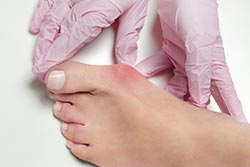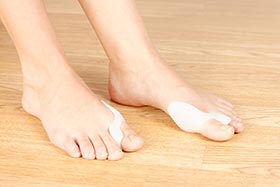What is bunion?
 A bunion is a foot deformity that forms around the toe joints and may cause pain. It could be associated with hallux valgus (big toe deformity) or other lesser toe deformities.
A bunion is a foot deformity that forms around the toe joints and may cause pain. It could be associated with hallux valgus (big toe deformity) or other lesser toe deformities.
What causes bunion?
People of all ages can get bunions. Possible factors that may cause bunions include:
- Prolonged wearing of ill-fitting, narrow pointed shoes
- Inflammatory conditions such as gout or rheumatoid arthritis
- Inherited foot structure such as flat foot
- Foot injuries
What are the symptoms of bunions?
You may experience the following symptoms if you have a bunion:
- Bulging bump on the outside of your big toe
- Redness, swelling, or soreness
- Pain and tenderness
- Restricted movement of your big toe, causing difficulty in walking
Bunions can develop slowly and worsen over time. Make an appointment to consult an orthopaedic specialist if your bunion causes persistent pain or affects your walking ability.
How is bunion diagnosed?
Besides noting your medical history and symptoms, your orthopaedic specialist will perform a physical examination to assess your foot condition.
Depending on the diagnosis and severity of your condition, imaging tests such as X-rays may be required to check the alignment of the bones of your toes.
What treatments are there for bunion?
 Bunion treatment is typically non-surgical. Although non-surgical treatment does not reverse a bunion, it can help to reduce pain and prevent your bunion from growing. Your orthopaedic specialist may also recommend surgery to remove your bunion permanently.
Bunion treatment is typically non-surgical. Although non-surgical treatment does not reverse a bunion, it can help to reduce pain and prevent your bunion from growing. Your orthopaedic specialist may also recommend surgery to remove your bunion permanently.
Medications
Painkillers and non-steroidal anti-inflammatory drugs may be prescribed to relieve pain and reduce swelling.
Physical Therapy
Massage or physical therapy can often help reduce pain and inflammation. The orthopaedic specialist may refer you to a physical therapist who will teach you exercises to improve muscle strength around the bunion.
Injections
Steroid injections are injected into the affected joint to reduce pain and swelling. It is an alternative treatment for people who wish to avoid surgery.
Orthotic Devices
Your orthopaedic specialist may recommend that you wear over-the-counter or custom-made shoe inserts to relieve pressure off your bunion.
Surgery
In some cases, the doctor will recommend surgery when non-surgical treatments or changes in footwear do not help. A bunion surgery is done to correct your toe position by re-aligning your bones, tendons, ligaments, and nerves.
How can I prevent a bunion?
Wearing poorly fitted footwear is one of the common causes of bunions. Therefore, it is important to make sure that your shoes fit correctly. Avoid shoes that are too narrow or higher-heeled shoes that put extra pressure on the forefoot. Instead, opt for shoes with wider tips and broader, softer soles.
Make an appointment
Make an appointment to consult an orthopaedic specialist. Select "Specialist Appointment". Under Specialist Appointment Details, select "Orthopaedic Surgery" or "Pain Management".
Make an enquiry. We will get back to you within 2 working days. You can reach us at 6311 2310.